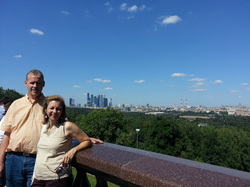 Our time in Moscow was both poignant and instructive. As we understand our year-long journey, it is a hybrid of opportunities to coach and train gifted leaders, and opportunities to learn: how churches and student ministries are doing, where Westerners might more effectively come alongside them, and what not to do. Moscow was heavily weighted toward that latter task. It’s easier, in many ways, to be in settings where we are teaching—so far our teaching has been well-received and has served as a natural springboard for relational coaching conversations that seem to be genuinely helpful. Moscow was less satisfying, but an extremely valuable part of our education and formation. Originally Moscow was geographically ‘on our way’ between Novosibirsk and a final conference in Ukraine (which has for good reasons been moved elsewhere). So, we made efforts to see if any training or teaching we might do would be welcomed there. Our main contact there replied, essentially, “Nyet.” But he did also generously host us in a dorm room in his church building, walk us around his stunning city, and talk at length with us over several meals in his home. His self-taught English is quite good, and his insights about the state of the church in Russia were wise. He narrated the massive influx of eager Westerners who rushed in headlong as the Soviet Union collapsed. Buildings were hastily built, praise choruses translated, and huge stadiums were rented for evangelistic rallies and mega-concerts. We from the United States came, we saw, we thought we had conquered; we patted ourselves on the backs and headed home. I know that is an oversimplification and I don’t intend it to dishonor the many who came and served in humility for long stretches—they are true saints. But it was telling that when Rich attended a meeting of pastors, they asked each other in Russian, “What does he want? Is he looking for money? What does he want?” Our pastor friend shared about a pair of zealous teachers (mercifully not from America) who came to Moscow recently on a scouting trip to set up a big event where they could get a platform for their self-reportedly immense preaching gifts. They were looking, the pastor said, for “free ears.” I groaned at their arrogance. At times it was painful to sit through the meals at which the pastor lamented the mistakes of our kin. We’ve made similar ones over the years. And different ones. But we worked hard to listen, and by the end, his parting words were very warm. He said we seemed like the kinds of people who would come alongside, encourage, and mentor others, not simply tell them what to do. I replied, “Yes, we HAVE free ears.” He smiled broadly. I think we rebuilt some trust with this pastor—not all Westerners just want to swoop in and perform for a big audience and exit stage right. Offering our ears freely is chief among my hopes for our year. I’m reminded of the call to those who do medical work: “First, do no harm.” We’ll inevitably make minor cross-cultural mistakes, but I hope that in general we’ll do no lasting harm in the places we go! If beyond that we can become more intelligent about global mission today, excellent. If on top of that we get a chance to make a deposit of good teaching and training, and an encouraging relational investment in those who live and minister in the places we go, even more excellent. For this time around in Moscow, keeping our ears free and our hearts open seemed to be all God asked of us.
1 Comment
7/24/2014 01:57:32 pm
Lisa & Rich,
Reply
Leave a Reply. |
Archives
April 2024
AuthorRich and Lisa Lamb Categories |
 RSS Feed
RSS Feed